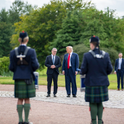Boris Johnson has always played the fool. The Tories’ Lord of Misrule has spent his entire life pushing the boundaries and railing against convention. He has broken the rules and got away with it, but there was always a sense among his family and friends that one day he would grow up and put his youthful indiscretions behind him. The clown would turn into a statesman, or transform like Shakespeare’s Prince Hal in Henry IV part one, who rejects Falstaff to become a worthy king—“like bright metal on a sullen ground/My reformation, glittering o’er my fault/Shall show more goodly, and attract more eyes/Than that which hath no foil to set it off.”
For years, it never happened. As London mayor, Johnson prided himself on embodying the optimism of the 2012 Olympics, but he was still a joker, who was memorably photographed stuck on a zip-wire waving two union jacks. “Did I ham up the buffoon image or did I get trapped in it?” He mused to me at the time, before citing Dennis the Menace as his cartoon hero. Mischief was his guiding force and his newspaper columns were his pea-shooter.
Johnson had the chance to gravitate to gravitas when he was appointed foreign secretary, but he failed to do so. Instead, he was responsible for a series of diplomatic disasters that had profound consequences for people’s lives—British mother Nazanin Zaghari Ratcliffe is still in Iran, unable to be reunited with her husband and daughter, following one of his gaffes. He suggested that the Libyan city of Sirte would have a bright future if it simply “cleared the dead bodies away” and insulted Britain’s European allies. Ambassadors and civil servants lost all respect for him and the intelligence agencies reportedly became nervous about sharing confidential information in case it “popped up in an after-dinner speech.” One of his former ministerial colleagues Alan Duncan suggested that he had become Johnson’s “pooper scooper” because he had cleared up his mess so many times.
Now Johnson is prime minister at a time of national crisis and he has finally been forced to grow up, acquiring a new seriousness of purpose and personality. The coronovirus pandemic is not a joking matter. There is no room for mischief when people are being forced into self-isolation, planes grounded and schools closed. The political games that the Tory leader normally loves to play are also impossible because the opponent is not a Westminster rival but a deadly disease.
What is interesting is how Johnson, the great survivor, has adapted to the extraordinary situation he finds himself. No prime minister wants to deliver the sickening message that “many more families are going to lose loved ones.” Instead of playing the fool, often using humour as a diversionary tactic to avoid answering difficult questions, he is trying to level with the public about the difficult choices he has to make.
The divisive populist has been banished for now and Johnson is trying to bring the country together in a war-time effort to fight an invisible foe. Unlike Donald Trump, who denounced Covid-19 as a “foreign virus” and the “Chinese” disease, he has not tried to exploit public fear for political gain. In the past Johnson allied himself with Michael Gove’s infamous suggestion that “the British people have had enough of experts,” but now he appears flanked at every opportunity by the government’s chief medical officer and chief scientific adviser, on whom he is relying to guide him through the pandemic.
The cynical politician who avoided media scrutiny and lied his way to the top has been replaced by an ostentatiously open leader who is holding daily press conferences. Ministers have started appearing on the Today programme again and the prime minister’s communications director Lee Cain has called a truce with the media, promising to “wipe the slate clean” and share information widely. The off-the-record briefings that caused confusion and provoked anxiety have been almost universally denounced. The tribalism of recent years has been replaced by an attempt to build a cross-party consensus.
Meanwhile, the puerile attacks on the BBC, the civil service and the judiciary have stopped as Downing Street recognises the need for the country to pull together. The teachers and other public servants, who were once denounced as “the blob,” are now the heroes on the frontline helping to defeat the virus alongside doctors and delivery drivers. A Tory leader who once tried to woo his party’s Eurosceptics by declaring “fuck business” is now pouring billions into propping it up. Instead of banning the CBI from events, No 10 is appealing to companies to divert resources into producing ventilators to treat the sick. The prime minister has stopped using rhetoric as a polarising force—as he did when he compared women who wear the burka to letter boxes—and is deploying his talent with words to communicate difficult concepts and painful demands.
It’s too early to say whether the government’s strategy will work. There are serious questions about the lack of testing, the speed at which social distancing rules have been introduced and the ambiguity of the government’s message. But I don’t buy the conspiracy theories that an evil Tory leader is willing to sacrifice the weak and vulnerable for the sake of creating herd immunity in the wider population. For better or worse, Johnson is listening to the scientists and acting on their advice. He has risen to the occasion with an attitude that is serious, measured, rational and open. On the pandemic, he is at least trying to do the right thing, although on many other issues his Shakespearean “reformation” is very far from complete.
I am a Boris Johnson sceptic but his response to this crisis deserves our respect
The prime minister has shown seriousness when it mattered most
March 20, 2020

Photo: Leon Neal/PA Wire/PA Images











